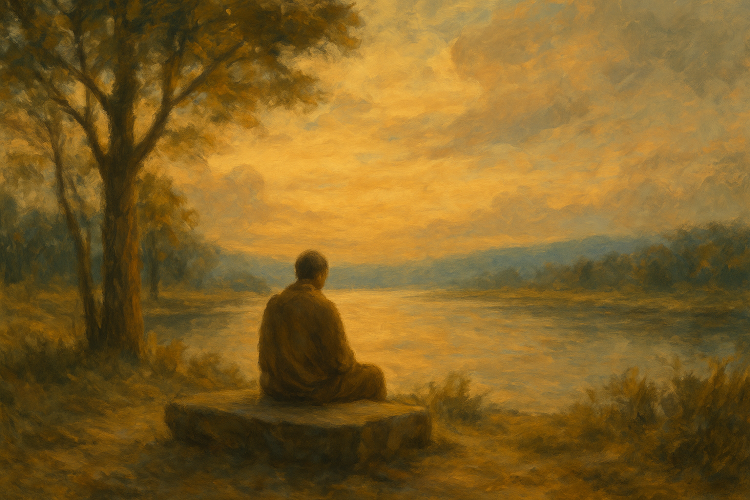Let the World Slow Down: Reclaiming the Human Soul in an Age of Disruption
In a world obsessed with speed and disruption, people crave stillness. This essay explores the soul’s rebellion against chaos, the politics of turning inward, and why slowing down may be the most revolutionary act of our time.

In a world addicted to velocity, silence has become a rebellion. The modern era promises progress through constant disruption—of industries, ecosystems, nations, and even inner lives. But beneath the noise of breaking news, viral content, and algorithmic frenzy, a deeper human hunger grows louder: the desire to slow down, to return to essence, to be human again.
We are told to keep moving—to innovate, to globalize, to "disrupt or die." But the cost is showing. Burnout is pandemic. Inequality grows more grotesque. Wars no longer shock; they trend. Meanwhile, the most-watched video on any given day could easily be someone peeling an egg with a spoon while whispering affirmations. On the surface, it’s absurd. But beneath it lies something raw and true: people craving peace, order, and simplicity in a world engineered for overstimulation.
The irony is profound. People crave stillness while the systems governing the world chase acceleration. There’s a misalignment at the core of human experience today—between what is profitable and what is sustainable, between the pace of markets and the rhythm of the soul.
Disruption, once a startup buzzword, has metastasized into every sphere of life. Technology disrupts attention spans; economics disrupt local livelihoods; foreign policy disrupts entire civilizations. Even terror thrives on this disruption—fueled by oil money, geopolitical maneuvering, and regional instability that is often less accident than design.
We live in a world that exports chaos and imports despair.
And yet, within that chaos, some voices call for something radically different: to turn inward, to slow down, to focus not on constant global expansion but inner repair. This is where political instincts that may seem controversial on the surface can actually reveal a deeper emotional truth. For example, one could view Donald Trump’s “America First” agenda not only through the lens of populism or nationalism but as a kind of spiritual longing—a desire for a superpower to stop playing world police and instead reflect on its own fractured soul.
This isn’t an endorsement of Trump’s every policy or tone. The contradictions are undeniable: calls for peace mixed with inflammatory speech, protectionism paired with division. But the instinct to return home—to assess from within before acting outward—is not only valid; it is necessary. America, like many nations, has overextended itself economically, militarily, and morally. The cost of its constant outreach has been internal decay: crumbling infrastructure, frayed social trust, and a populace that feels increasingly alienated from the very idea of national identity.
A nation, like a person, must come home to itself before it can lead others.
This idea transcends party lines and political tribes. It is philosophical. If a society cannot sit with its own silence, grieve its own contradictions, and nourish its own people, then its outward projection—whether through military intervention or cultural export—will be hollow at best, toxic at worst.
We must also be clear: turning inward is not the same as turning against others. A politics of reflection must not collapse into scapegoating or exclusion. To slow down is not to isolate—it is to become intentional. It is to ask: what are we doing, and why? Who benefits? Who suffers? Can we live differently?
True sovereignty begins with the individual soul. It is the ability to discern, to feel, to respond—not just react. But our systems punish this. Try living slowly in a gig economy. Try thinking deeply in a clickbait world. Try being human in a society designed for consumption and productivity. You will feel, very quickly, like you're failing.
But you are not failing. You are resisting.
To embrace slowness is to defy a world built on speed and spectacle. It is to reclaim rhythm over reaction, depth over display. It is to choose meaning over metrics.
And maybe, just maybe, that is how we begin to heal—not just individually but collectively. Maybe the path forward is not more disruption, but deliberate reorientation. Less global domination, more internal restoration. Less optimization, more contemplation. Not because the world doesn't matter—but because we cannot serve the world authentically if we are estranged from ourselves.
Let the world slow down. Let nations pause. Let the soul speak. Because if we don’t, we risk a future where technology advances, markets flourish, and humanity forgets what it means to be whole.